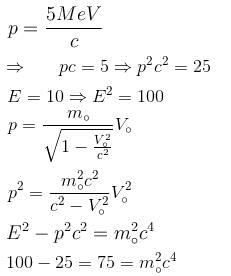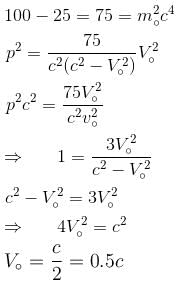Physics Exam > Physics Questions > What is the speed of a particle having a mome...
Start Learning for Free
What is the speed of a particle having a momentum of 5MeV/c and a total relativistic energy of 10 MeV (in terms of c)?
Correct answer is '0.5'. Can you explain this answer?
| FREE This question is part of | Download PDF Attempt this Test |
Verified Answer
What is the speed of a particle having a momentum of 5MeV/cand a total...


The correct answer is: 0.5
Most Upvoted Answer
What is the speed of a particle having a momentum of 5MeV/cand a total...
Momentum and Relativistic Energy
To understand the speed of a particle with a given momentum and total relativistic energy, we need to analyze the relationship between momentum, energy, and speed in the context of special relativity.
Momentum (p)
Momentum is defined as the product of an object's mass (m) and its velocity (v). In the context of relativistic physics, momentum is given by the equation:
p = γ * m * v
where γ is the Lorentz factor, given by:
γ = 1 / sqrt(1 - (v^2 / c^2))
Here, c represents the speed of light in a vacuum, approximately 3 x 10^8 meters per second.
Relativistic Energy (E)
The relativistic energy of a particle is given by the equation:
E = γ * m * c^2
where m is the mass of the particle and c is the speed of light.
Given Information
In this question, we are given that the momentum of the particle is 5 MeV/c and the total relativistic energy is 10 MeV.
Calculating the Speed
To find the speed of the particle, we can equate the equations for momentum and relativistic energy:
γ * m * v = p
γ * m * c^2 = E
Using these equations, we can eliminate γ and m to find the speed (v):
v = p / (γ * m) = p / (E / (γ * c^2))
Substituting the given values into the equation:
v = (5 MeV/c) / (10 MeV / (γ * c^2))
Simplifying further:
v = (5 MeV/c) / (10 MeV / (1 / sqrt(1 - (v^2 / c^2)) * c^2))
v = (5 MeV/c) / (10 MeV * sqrt(1 - (v^2 / c^2)) / c^2)
v = (5 / 10) * sqrt(1 - (v^2 / c^2))
v = 0.5 * sqrt(1 - (v^2 / c^2))
To solve this equation, we can square both sides:
v^2 = 0.25 * (1 - (v^2 / c^2))
v^2 = 0.25 - 0.25 * (v^2 / c^2)
1.25 * (v^2 / c^2) = 0.25
v^2 / c^2 = 0.25 / 1.25
v^2 / c^2 = 0.2
v^2 = 0.2 * c^2
v = sqrt(0.2 * c^2)
v ≈ 0.447 c
Therefore, the speed of the particle is approximately 0.447 times the speed of light (c).
To understand the speed of a particle with a given momentum and total relativistic energy, we need to analyze the relationship between momentum, energy, and speed in the context of special relativity.
Momentum (p)
Momentum is defined as the product of an object's mass (m) and its velocity (v). In the context of relativistic physics, momentum is given by the equation:
p = γ * m * v
where γ is the Lorentz factor, given by:
γ = 1 / sqrt(1 - (v^2 / c^2))
Here, c represents the speed of light in a vacuum, approximately 3 x 10^8 meters per second.
Relativistic Energy (E)
The relativistic energy of a particle is given by the equation:
E = γ * m * c^2
where m is the mass of the particle and c is the speed of light.
Given Information
In this question, we are given that the momentum of the particle is 5 MeV/c and the total relativistic energy is 10 MeV.
Calculating the Speed
To find the speed of the particle, we can equate the equations for momentum and relativistic energy:
γ * m * v = p
γ * m * c^2 = E
Using these equations, we can eliminate γ and m to find the speed (v):
v = p / (γ * m) = p / (E / (γ * c^2))
Substituting the given values into the equation:
v = (5 MeV/c) / (10 MeV / (γ * c^2))
Simplifying further:
v = (5 MeV/c) / (10 MeV / (1 / sqrt(1 - (v^2 / c^2)) * c^2))
v = (5 MeV/c) / (10 MeV * sqrt(1 - (v^2 / c^2)) / c^2)
v = (5 / 10) * sqrt(1 - (v^2 / c^2))
v = 0.5 * sqrt(1 - (v^2 / c^2))
To solve this equation, we can square both sides:
v^2 = 0.25 * (1 - (v^2 / c^2))
v^2 = 0.25 - 0.25 * (v^2 / c^2)
1.25 * (v^2 / c^2) = 0.25
v^2 / c^2 = 0.25 / 1.25
v^2 / c^2 = 0.2
v^2 = 0.2 * c^2
v = sqrt(0.2 * c^2)
v ≈ 0.447 c
Therefore, the speed of the particle is approximately 0.447 times the speed of light (c).

|
Explore Courses for Physics exam
|

|
Similar Physics Doubts
What is the speed of a particle having a momentum of 5MeV/cand a total relativistic energy of 10MeV(in terms ofc)?Correct answer is '0.5'. Can you explain this answer?
Question Description
What is the speed of a particle having a momentum of 5MeV/cand a total relativistic energy of 10MeV(in terms ofc)?Correct answer is '0.5'. Can you explain this answer? for Physics 2024 is part of Physics preparation. The Question and answers have been prepared according to the Physics exam syllabus. Information about What is the speed of a particle having a momentum of 5MeV/cand a total relativistic energy of 10MeV(in terms ofc)?Correct answer is '0.5'. Can you explain this answer? covers all topics & solutions for Physics 2024 Exam. Find important definitions, questions, meanings, examples, exercises and tests below for What is the speed of a particle having a momentum of 5MeV/cand a total relativistic energy of 10MeV(in terms ofc)?Correct answer is '0.5'. Can you explain this answer?.
What is the speed of a particle having a momentum of 5MeV/cand a total relativistic energy of 10MeV(in terms ofc)?Correct answer is '0.5'. Can you explain this answer? for Physics 2024 is part of Physics preparation. The Question and answers have been prepared according to the Physics exam syllabus. Information about What is the speed of a particle having a momentum of 5MeV/cand a total relativistic energy of 10MeV(in terms ofc)?Correct answer is '0.5'. Can you explain this answer? covers all topics & solutions for Physics 2024 Exam. Find important definitions, questions, meanings, examples, exercises and tests below for What is the speed of a particle having a momentum of 5MeV/cand a total relativistic energy of 10MeV(in terms ofc)?Correct answer is '0.5'. Can you explain this answer?.
Solutions for What is the speed of a particle having a momentum of 5MeV/cand a total relativistic energy of 10MeV(in terms ofc)?Correct answer is '0.5'. Can you explain this answer? in English & in Hindi are available as part of our courses for Physics.
Download more important topics, notes, lectures and mock test series for Physics Exam by signing up for free.
Here you can find the meaning of What is the speed of a particle having a momentum of 5MeV/cand a total relativistic energy of 10MeV(in terms ofc)?Correct answer is '0.5'. Can you explain this answer? defined & explained in the simplest way possible. Besides giving the explanation of
What is the speed of a particle having a momentum of 5MeV/cand a total relativistic energy of 10MeV(in terms ofc)?Correct answer is '0.5'. Can you explain this answer?, a detailed solution for What is the speed of a particle having a momentum of 5MeV/cand a total relativistic energy of 10MeV(in terms ofc)?Correct answer is '0.5'. Can you explain this answer? has been provided alongside types of What is the speed of a particle having a momentum of 5MeV/cand a total relativistic energy of 10MeV(in terms ofc)?Correct answer is '0.5'. Can you explain this answer? theory, EduRev gives you an
ample number of questions to practice What is the speed of a particle having a momentum of 5MeV/cand a total relativistic energy of 10MeV(in terms ofc)?Correct answer is '0.5'. Can you explain this answer? tests, examples and also practice Physics tests.

|
Explore Courses for Physics exam
|

|
Suggested Free Tests
Signup for Free!
Signup to see your scores go up within 7 days! Learn & Practice with 1000+ FREE Notes, Videos & Tests.













